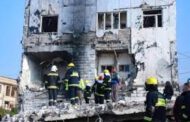Former US President Barack Obama has said President Donald Trump‘s decision to withdraw the US from the historic Iran nuclear deal signed during Mr Obama’s time in office is “so misguided” and a “serious mistake”.
In a lengthy Facebook post: “There are few issues more important to the security of the US than the potential spread of nuclear weapons, or the potential for even more destructive war in the Middle East. That’s why the US negotiated the Joint Comprehensive Plan of Action (JCPOA) in the first place”.
Mr Trump has long criticised the deal and said earlier today that the deal did not go far enough in ensuring Tehran’s compliance and said the US would be withdrawing from it. Iran is a “regime of great terror” and that “no action taken by the regime has been more dangerous than its pursuit of nuclear weapons and the means of delivering them,” Mr Trump said.
“The reality is clear. The JCPOA is working – that is a view shared by our European allies, independent experts, and the current U.S. Secretary of Defense. The JCPOA is in America’s interest – it has significantly rolled back Iran’s nuclear program,” Mr Obama wrote.
Though the Trump administration agreed Iran’s nuclear programme is a major threat, the president announced in October 2017 he would not re-certify a nuclear deal signed by Iran and six world powers. Despite the evidence provided by the United Nations on Tehran’s compliance with the deal, Mr Trump said it was too lenient on Iran and has maintained the idea that the country has violated portions of it.
Not re-certifying the deal or abandoning it will open the door for harsher economic sanctions to be placed on the country, the mitigation of which was a key inducement for Iran to comply with the historic deal. What concerned many Washington insiders – and today’s announcement may have proven them right – is that Mr Trump’s newest hire as National Security Adviser John Bolton has been quite hawkish on pulling out of the deal as is new Secretary of State Mike Pompeo, who has called the agreement “disastrous”.
Mr Obama countered that the agreement is a “model” for what this kind of diplomacy should look like, citing the verification and testing procedures in place within the accord as proof. Though the former president encouraged debate on the Iran nuclear deal, he said it “should be informed by facts” and went on to outline several key points of the agreement including that it has worked in rolling back Tehran’s nuclear programme. “Iran has destroyed the core of a reactor that could have produced weapons-grade plutonium; removed two-thirds of its centrifuges (over 13,000) and placed them under international monitoring; and eliminated 97 percent of its stockpile of enriched uranium – the raw materials necessary for a bomb,” Mr Obama said.
“Walking away from the [Iran deal] turns our back on America’s closest allies, and an agreement that our country’s leading diplomats, scientists, and intelligence professionals negotiated,” he wrote in a rare directly political message in his post-term time.
He noted that there will always be some changes from one administration to the next in a democracy, but he said “the consistent flouting” of multilateral agreements by Mr Trump “risks eroding America’s credibility, and puts us at odds with the world’s major powers”.
He was likely referring to the Paris Agreement on climate change, which the US also signed under Mr Obama’s second term in 2015. The global accord was signed by nearly 200 countries in an effort to curb greenhouse gas emissions and contain global warming to 2 C. Mr Trump announced in June 2017 that the US had begun the withdrawal process from the deal because it put American workers at an “economic disadvantage”.
Mr Obama also tied the deal to US relations with North Korea and attempting to stem the hermit kingdom’s nuclear ambitions. “At a time when we are all rooting for diplomacy with North Korea to succeed, walking away from the JCPOA risks losing a deal that accomplishes – with Iran – the very outcome that we are pursuing with the North Koreans,” he wrote.
Mr Trump is expected to meet with North Korean leader Kim Jong-un at a time and date yet to be publicly announced. The meeting will come just weeks after Mr Kim and South Korean President Moon Jae-in signed a peace agreement in an elaborate ceremony in the Demilitarised Zone on the border in the divided peninsula.
Iran’s leader Hassan Rouhani has instructed the country’s atomic agency to prepare to enrich uranium and said Mr Trump’s announcement constituted “a psychological war, we won’t allow [him] to win”.














